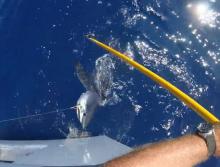New Zealand and Fiji rewarded for their efforts in major Pacific shark tagging study

New Zealand and Fiji rewarded for their efforts in major Pacific shark tagging study
One of the aims of the Common Oceans ABNJ Tuna Project is to reduce the impacts caused by tuna fishing on biodiversity in the marine areas beyond national jurisdiction (ABNJ) by improving data and assessment methods for sharks, thereby promoting their effective management. As part of this project, the Western and Central Pacific Fisheries Commission, with technical support from the National Institute for Water and Atmospheric Research (NIWA) of New Zealand and additional funding from the European Union, is conducting a major study of shark post-release mortality. While many sharks caught on tuna longlines are retained and recorded as catch, others are released alive. However, the survival rate of the released sharks is unknown and this magnifies uncertainties when evaluating shark stock status and the effectiveness of no-retention management measures.
A WCPFC expert workshop in January 2017 produced a survey design that called for the deployment of 200 ‘survival’ popup electronic tags on 100 shortfin mako and 100 silky sharks. These survival tags are now being deployed on sharks caught and released by commercial tuna longline vessels representing a range of Pacific fishing fleets and nationalities. The tags record daily minimum and maximum depths and temperatures, and at the end of the deployment (60 days, or earlier if the shark dies or the tag pulls free from the shark) the tag is automatically released and pops up to the surface where it transmits its data to orbiting Argos satellites. These data can then be used to determine the fate of the tagged shark at the time of popup: live sharks continually move up and down in the water column whereas dead sharks sink to the seabed (after which their tags release themselves following two days of no vertical movement).
Tagging began in May 2017, and so far 37 mako and 10 silky sharks have been tracked. Most of the mako sharks were tagged in New Zealand waters, and all the silky sharks were tagged in Fiji waters. The New Zealand phase of the project has now been completed and showed that only one out of the 34 tagged makos did not survive. The focus has now been set on tagging more sharks in Fiji to see if the results will be similar there. Recently lottery-style prize drawings have been conducted to reward observers and fishing crews for their efforts --separate prize draws in New Zealand and Fiji have rewarded a total of seven taggers for their hard work. The tagging will soon be expanded to New Caledonia and the Republic of the Marshall Islands to complete the survey.
The Common Oceans ABNJ Tuna Project, funded by the Global Environment Facility and implemented by FAO, harnesses the efforts of a large and diverse array of partners including the five tuna Regional Fisheries Management Organizations, governments, intergovernmental organizations, non-governmental organizations and private sector, with the aim of achieving responsible, efficient and sustainable tuna production and biodiversity conservation in the ABNJ.
For more information, please contact:
Dr. Shelley Clarke, Common Oceans ABNJ Tuna Project Technical Coordinator-Sharks and Bycatch | shelley.clarke@fao.org

